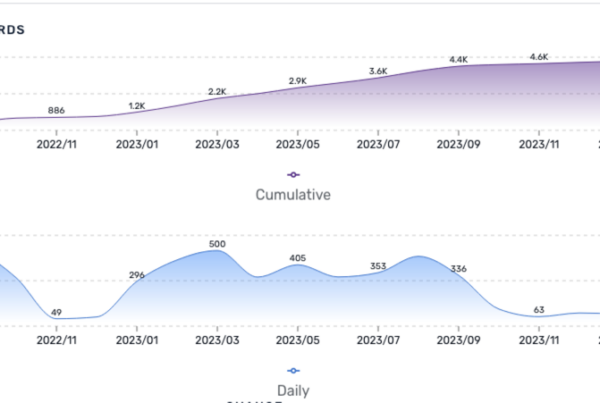This week, I achieved a goal that seemed immense when I started out:
I finished reading the entire transcripts of 75 episodes (3 seasons of 25 eps each) of one of my favourite creative works ever, Bakuman.

That’s 250,000 words in Japanese. For context, the longest Harry Potter book (Order of the Phoenix) — with 766 pages — has 257,000 words in English.
Over 11 months, I have read 413,000 words total (yes, I track all of it, using LingQ). It averages out to around 1,250 words per day.
I’ve also listened to the original audio of whatever I read.
Here’s a few new things I’ve learned:
#1. Consuming lots of content is the surest way of becoming fluent as an adult.
There’s a direct, almost linear relationship between how much content you consume, and how many new words and phrases you learn. These graphs say it all:




These are all words and phrases that I’ve actually *learned* (meaning, I don’t have to look them up anymore). I originally expected this curve to flatten over time, but there’ve been no plateaus or highs/lows whatsoever.
It’s gotten to a point where I can estimate, with a surprising level of accuracy, how many new words I’ll acquire in a given month or week, based on how much time I spend reading. Insane.
#2. There’s no such thing as a “plateau” in language learning.
There are no plateaus — except the one in your head (most likely), or unless you’re already fluent :)
The feeling of being “stuck” is an illusion. Go and read everyday for 30 days straight, and then tell me how stuck you feel. As long as you’re showing up to study everyday, you WILL progress. It’s just math.
Also, all this is from doing the bare minimum (since I founded a startup this year) — I read casually, rarely review what I’ve learned, and never try to memorize anything. I don’t refer to any structured courses or textbooks, and have found that once you move past the beginner stage, they’re more confusing than helpful.
Another interesting thing that happened is that my output (speaking and writing) is a lot more “natural,” and not artificial-sounding like my French, which I learned in school in the traditional classroom setting. I do make mistakes, but in terms of practical fluency, the difference between learning from real content vs textbooks is night and day.
Moreover, while I don’t have data for this, I also feel like textbook learning isn’t nearly as scalable as you can see in the graphs above.
